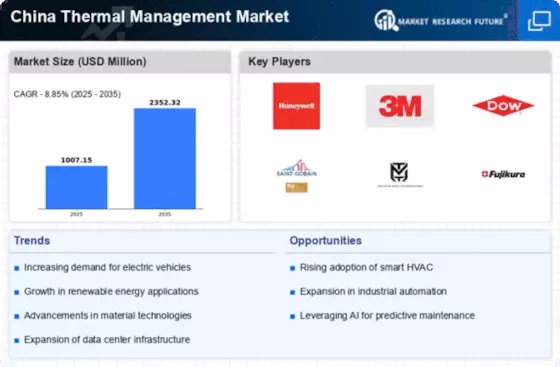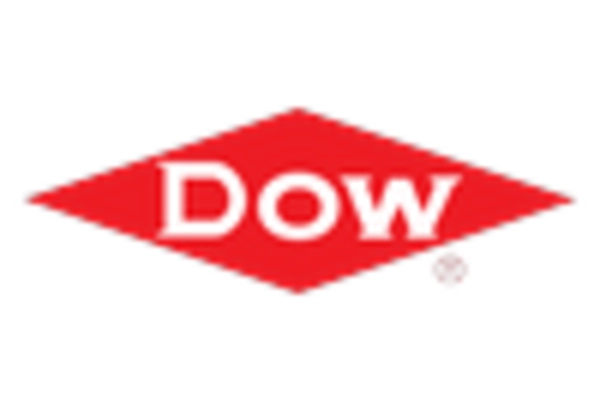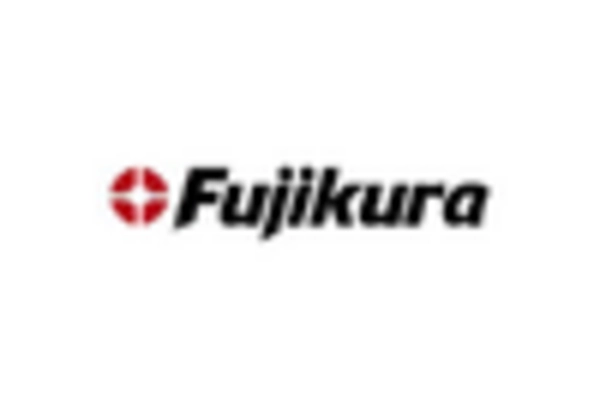Rise of Electric Vehicles
The increasing adoption of electric vehicles (EVs) in China is a pivotal driver for the China Thermal Management Market. As the government promotes EV usage through subsidies and incentives, the demand for efficient thermal management solutions rises. In 2025, the number of electric vehicles in China is projected to exceed 10 million, necessitating advanced thermal management systems to ensure optimal battery performance and longevity. This trend indicates a significant shift in automotive manufacturing, where thermal management plays a crucial role in vehicle design and functionality. Consequently, companies specializing in thermal management technologies are likely to experience substantial growth, as they cater to the evolving needs of the automotive sector.
Focus on Energy Efficiency
The emphasis on energy efficiency in China is a critical driver for the China Thermal Management Market. The government has implemented stringent regulations aimed at reducing energy consumption across various sectors, including manufacturing and transportation. In 2025, energy efficiency standards are expected to become even more rigorous, compelling industries to adopt advanced thermal management solutions. This focus on sustainability not only aligns with global environmental goals but also drives innovation in thermal management technologies. Companies that can provide energy-efficient solutions are likely to gain a competitive edge, as businesses strive to comply with regulations while minimizing operational costs.
Growth in Electronics Sector
The rapid expansion of the electronics sector in China significantly influences the China Thermal Management Market. With the country being a global leader in electronics manufacturing, the demand for effective thermal management solutions is paramount. In 2025, the electronics market in China is expected to reach approximately USD 1 trillion, driven by innovations in consumer electronics, telecommunications, and industrial applications. This growth necessitates advanced thermal management systems to prevent overheating and ensure device reliability. As manufacturers seek to enhance product performance and lifespan, the thermal management market is poised for growth, with companies developing innovative materials and technologies to meet these demands.
Advancements in Material Science
Innovations in material science are transforming the landscape of the China Thermal Management Market. The development of advanced materials, such as phase change materials and high-performance thermal interface materials, enhances the efficiency of thermal management systems. In 2025, the market for these materials is projected to grow significantly, driven by their application in various industries, including automotive, electronics, and aerospace. As manufacturers seek to improve thermal performance and reduce weight, the demand for these advanced materials is likely to increase. This trend suggests that companies investing in research and development of new materials will play a crucial role in shaping the future of thermal management solutions in China.
Government Initiatives and Policies
Government initiatives and policies aimed at promoting technological advancements are vital drivers for the China Thermal Management Market. The Chinese government has launched several programs to support research and development in thermal management technologies, particularly in the context of energy efficiency and environmental sustainability. By 2025, these initiatives are expected to foster collaboration between public and private sectors, leading to innovative solutions that address thermal management challenges. Additionally, policies encouraging the adoption of green technologies will likely stimulate market growth, as companies align their strategies with national objectives. This supportive regulatory environment is essential for the long-term development of the thermal management market in China.
















